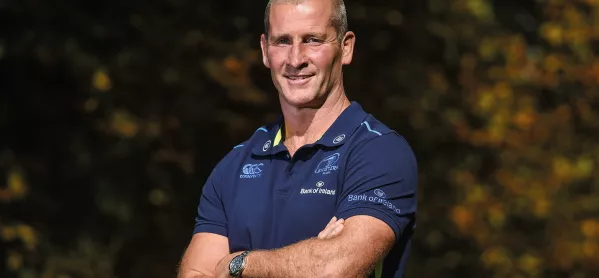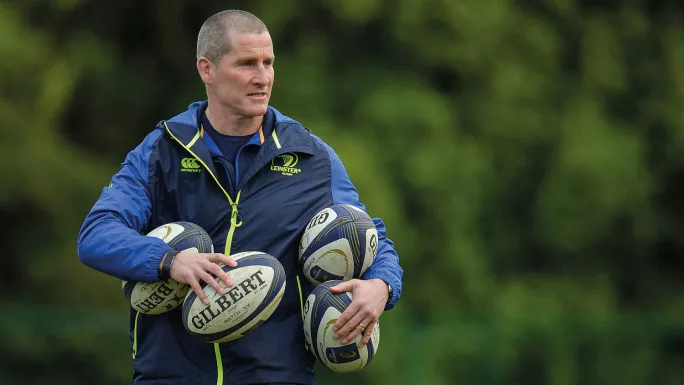- Home
- #ToYouFromTes: TES talks to...Stuart Lancaster
#ToYouFromTes: TES talks to...Stuart Lancaster

Stuart Lancaster’s worst teaching experience - trying to manage a “difficult” Year 9 geography class during his training placement - still informs him as a professional rugby coach. “I tried to be their friend in order to try to influence their behaviour, which worked for a while, but ultimately they chewed me up and spat me out,” he says. “There was a complete riot in the classroom and I was struggling to rein them back in. That balance, how you build that relationship - lots of those things you learn as a teacher.”
Best known as the former England rugby head coach who turned around a toxic team culture - and, less loftily, the one who led that team to its worst-ever performance in a World Cup (of which more later) - Lancaster is now senior coach with the Irish provincial side Leinster.
He is also a former PE teacher and, almost two decades after leaving for full-time rugby coaching, he remains passionate about the profession, often contributing to teaching conferences and referring to teachers as “we”.

There are “huge parallels” between teaching and coaching, he insists. “The things I’ve learned as a teacher have helped me as a coach,” he says. “How to talk to a group; the way you organise a session; the way you use your voice; how you vary between directive coaching and empowering.”
Those parallels also mean that he has since learned, as a rugby coach, things that he wishes he had known in his former career. Much of that has been about leadership and developing leadership skills.
For example, one lesson that the Rugby Football Union (RFU) has taken from his time in charge is the benefit of freeing up leaders from managerial burden. Since Lancaster’s departure after that disastrous 2015 World Cup campaign, in which England bombed out of their own tournament at the group stages, the RFU has appointed a team manager alongside the head coach. “On the back of my recommendation,” Lancaster is quick to point out.
Creating space
He says the same role needs to be put in place for headteachers. “When I reflect back now to my international coaching period, I wish I’d had someone beside me who would have taken some of the managerial things off me to allow me to concentrate on the leadership and coaching,” he explains, “and that’s something, if I was involved in the education system, I would try to do.
“I would try to make sure that the heads and the people at the top of the organisation are involved in the leadership role, where they are setting the vision for the future and driving the value and the culture of the organisation, but also still have the capacity and space in their day to spend time with pupils and the staff…and that does require someone to take that managerial burden off the headteacher.”
Leadership - the why, as well as the who and the how - is clearly something of an obsession for Lancaster, who claims to have “hundreds” of books on the subject on his shelves at home in Leeds. It’s something that he thinks that the teaching profession needs to spend more time developing - in both teachers and pupils.
“If you ask me what’s the magic wand I’d like to wave, it would be to improve the development of leadership and managerial skills of those teachers who are going to become the leaders of the schools,” Lancaster says. “As teachers, we end up flat out doing the day job and we miss the chance to do any self-development, and there needs to be more done to develop the next generation of school leaders.”
Extra time
That doesn’t mean he thinks you can’t take some responsibility for that professional development yourself. “It’s down to you as an individual to develop that self-motivation to do it, number one, but also to find the time to do it. The biggest excuse everyone can make is, ‘I haven’t got the time because I’m too busy doing the day-to-day job’ - but I would argue that we can all find the time, it’s just putting it as a priority.”
But do enough people actually want to get into a leadership role? Lancaster muses that “in elite sport, you are judged on one event [owing to] the public nature of the result. You have an influence over the result but not control; you rely on your players to deliver on the day and if they don’t deliver then, ultimately, you are accountable.”
When it is suggested that his description does not sound dissimilar to modern exam results, he does not demur. He thinks that the government needs to push sharply away from creating that environment.
“My advice to the government would be: don’t judge anything by an exam result. The education of young people is about academic subjects, but, equally, I would 100 per cent be investing more time in developing students in terms of leadership, in terms of ability to communicate, emotional intelligence and life skills,” Lancaster says.
We need to make sure that the education system is creating rounded pupils. I would say to staff, ‘Let’s just focus on the process,’ because if you constantly strive to achieve the outcome, then I think you often slip up along the way.
“If you do the right thing every day - you teach well, you prepare well, and you work hard to get the best out of every individual to make them as good as they can be - then, ultimately, that’s success.
“I can still reflect back now to some of the pupils who I taught who I don’t think achieved many passes at GCSE level, but I see that I made a connection with them, made a difference to them, so they’ve gone on to be successful in life - and that, for me, is as important.”
It is widely recognised that Lancaster’s success story as England coach was a wholesale overhaul of team culture, from tawdry tabloid headlines to player pride in their jerseys. The process he went through - getting the right people in place and then defining shared purpose, identity, values, behaviours and standards - can be applied by headteachers to schools, he says.
“When I reflect back to my time as a teacher, we would spend a lot of time doing the day-to-day, the week-to-week administration involved in the job,” he explains. “When we had those Inset days, or teacher training days or whatever, I often wished we could spend more time talking about the reason why we all wanted to be teachers, how we wanted to make a difference and what the identity of the school that we represent stands for, and building the values around that identity.”
One-to-ones
Equally, Lancaster has really learned the value of individual relationships in his coaching career and this, too, is something schools should try to mimic, he says. He spent his first weeks at Leinster, from September last year, meeting “with every player and every member of staff. It’s demanding because you’ve got a lot of relationships to build but, if you want to do it successfully, that’s the glue that holds the team together through the good times and the bad.”
And his final lesson from the world of elite coaching is that standards need to be high, but that this does not mean an iron fist or a punitive culture has to be used to hit that high standard. Whether on the rugby field, in a school or in an individual classroom, the balance between expectations and how those expectations are supported is crucial, he says.
“People tend to thrive in an environment where they know the standard that’s required,” he explains. “It shouldn’t be like a boot camp where people aren’t allowed to express their personality or make independent decisions, but there has to be some sort of standard that is set - and if the bar’s set high, people often prefer it that way.”
Stuart Lancaster has launched The Leadership Club, a subscription-based online course to help leaders and managers develop their skills. For more information, go to www.stuartlancaster.com
Jennifer Richardson is a freelance journalist and lecturer in journalism at Kingston University
Keep reading for just £1 per month
You've reached your limit of free articles this month. Subscribe for £1 per month for three months and get:
- Unlimited access to all Tes magazine content
- Exclusive subscriber-only stories
- Award-winning email newsletters


